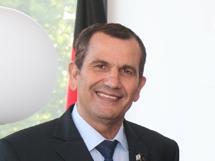Driven by the media coverage now MPs, political groups and the federal government were eager to think about the legal regulation of circumcision of minors for non-medical reasons - a subject which never led to political dispute in Germany before. As the public debate focused primarily on the Jewish practice of circumcision, KAS Israel spoke to the vice president of the Knesset, Mr Jacob Edery.
Mr Edery, you often speak with citizens in Israel. How do people in your country view the German circumcision debate? To what extent are people moved here actually by the discussion?
The topic is considered among the Jews in Israel and around the world as a very central one. The emotions are loaded, especially since the case is taking place in Germany. The majority of the Israeli public does not know and does not distinguish that there is only a judgment of a particular court in a German city. The population thinks the decision was taken by the Federal Government. This is the common perception here.
What makes this debate in Germany so special? After all there are debates in other European countries and in the USA as well.
In other countries, Europe is dealing mainly with the ban on kosher shechita. The topic ”circumcision” is widely discussed all over the world, sometimes even in Israel. In no other country but Germany there has been a court judgment or official decision to ban circumcision. Thus, we have the first case of a ”circumcision ban” in Germany - with all that it entails.
Only recently you have spoken with several representatives in Europe and particularly in Germany over the practise of shechita. Do you have the impression that the practice of religious traditions of Jews and Muslims in Germany and Europe are gradually repressed from an anti-religious attitude and restricted by law?
In my opinion, this is a consequence of different reasons: First, there are the efforts of the Greens, by associations and other animal protection organizations, on the other hand, we observe also anti-Semitic tendencies in the past. As we know, European countries have already banned the kosher shechita and circumcision back in the day. Today, we are witnessing a repetition of that. However, there are members of parliament in Europe to understand Judaism and the sensitivity of the religious matter. They also seek to find a mutually acceptable solution. Through the discussions we held, I got the feeling also anti-religious tendencies toward Jews and Muslims exist.
The topic can also be viewed from another perspective. Eventually an understanding of the rights of children has steadily developed. In your opinion – is it not legitimate to place the welfare of the child at the center of the discussion?
The welfare of children is important to all of us, and you should therefore take all measures to protect the health of children by all the rules. Nevertheless, I must say as a former Israeli Minister of Health, that while there are malpractices in operations around the world, in all fields of medicine, no one has thought of banning surgery. In that regard, I do not think circumcision should be banned generally due to malpractice of a “mohel” (professional circumciser) or a doctor. Of course you have to put all your efforts to keep the injury to the child as low as possible.
How can the debate in the Knesset be characterized, including Muslim parliamentarians? How might the Knesset and the Bundestag, in your opinion as chairman of the Israeli-German Parliamentary Friendship Group, push the process forward?
The Knesset and its committees are dedicated to the discussion in a rather non-emotional and businesslike fashion. On this subject, Jews, Muslims and Christians alike participate. For me, as chairman of the Israeli-German Parliamentary Friendship Group, a collaboration with the German Parliament is very important. In the past, today and in the future I will try to ensure cooperation between Bundestag and Knesset, and Israel and Germany.
I want to emphasize that personally, I am not a religious person but to me the tradition of the Jewish people is most important. We step against every state in the world that wants to hurt our religious tradition that has existed for thousands of generations.
Thank you Mr Edery!
The interview was conducted by Palina Kedem, Catherine Hirschwitz and Florian S. Seibt.
Translated by Simon Perger.



